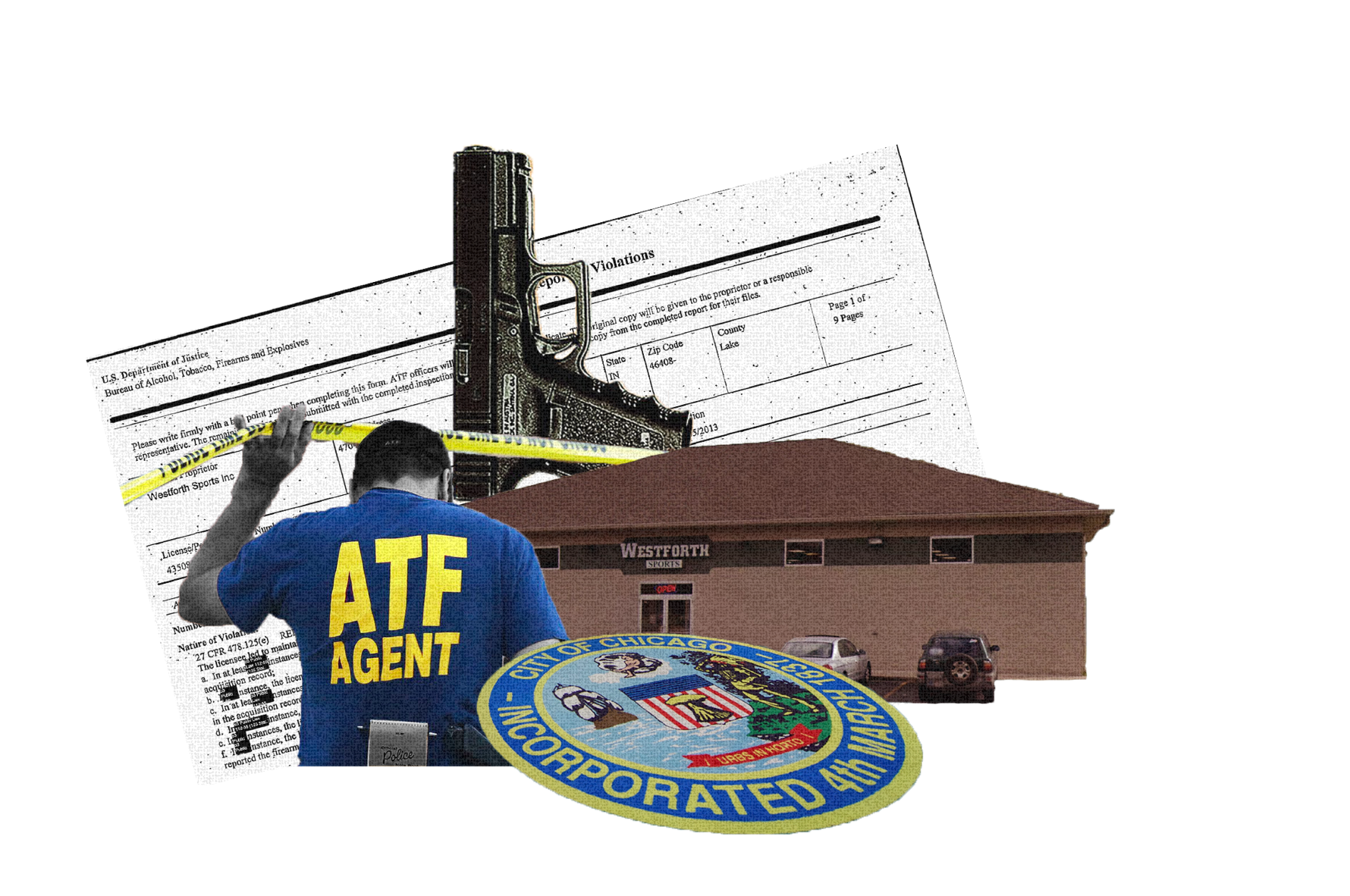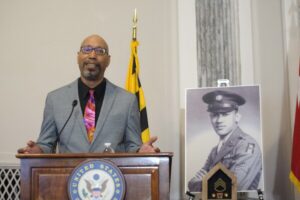A report from the Chicago mayor’s office named gun stores whose wares consistently wound up in city crimes. ATF records show the agency was lenient.
This story was produced in partnership with USA TODAY.
Over the last two decades, the Bureau of Alcohol, Tobacco, Firearms and Explosives let some of the Midwest’s most notorious gun sellers off the hook for serious violations of federal law, including selling to straw purchasers, transferring guns without background checks, and doctoring sales records.
The Trace and USA TODAY obtained ATF inspection records for 13 gun dealers singled out by the city of Chicago as suppliers of a disproportionate number of guns used in city crimes. The records show the agency found more than 120 violations of the federal Gun Control Act of 1968 at these stores. Only one store passed its inspection with no violations.
In 2017, on the heels of a record-breaking surge in homicides in Chicago, then-mayor Rahm Emanuel published a sweeping Gun Trace Report, which identified the sellers of thousands of guns recovered by Chicago police between 2013 and 2016. It showed nearly 1 in 4 guns picked up by city police came from just 10 stores located across Illinois and northern Indiana. The top three stores together accounted for some 2,000 crime guns.
T he Trace requested inspection documents from the ATF for the gun dealers named in this report. They reveal that the ATF routinely issued softer penalties than warranted under agency guidelines when it discovered violations at these stores — in step with a pattern of conciliatory inspections first uncovered by The Trace and USA TODAY last year.
That investigation found that between 2015 and 2017, the ATF regularly downgraded penalties for lawbreaking retailers across the U.S. The review of more than 2,000 gun dealers showed that many had brazenly flouted federal laws, selling weapons to convicted felons and domestic abusers, lying to inspectors, and falsifying ledgers to hide their misconduct. When the ATF discovered these violations, it often issued warnings, sometimes repeatedly, and allowed stores to stay open.
The new batch of records obtained by The Trace and USA TODAY provides details of inspections conducted as far back as 2009, and suggests the ATF’s lax approach to investigating gun dealers has continued for significantly longer than originally known.
In seven instances related to the stores supplying Chicago with crime guns, the ATF issued softer penalties than violations warranted. In at least three inspections, the agency discovered problems severe enough to warrant revoking a dealer’s license, but issued warnings instead.
In a statement, an ATF spokesperson said “supervisors and managers make recommendations based on the totality of the inspection and in accordance with policy to ensure consistent enforcement nationwide. ATF can only revoke for willful violations of the Gun Control Act.”
The National Shooting Sports Foundation, the industry’s trade association, did not respond to a request for comment.
In four agency inspections at Blythe’s Sports Shop in Griffith, Indiana, between 2000 and 2009, the ATF issued warnings to owner Rodger Blythe for violations that included selling to underage customers and to someone who identified themself as a convicted felon, failing to notify the ATF of multiple sales, and failing to properly record firearm transfers.
In a 2011 inspection, investigators found that the store had “aided the making of false statements” on federally mandated purchasing forms and sold to a person buying weapons on behalf of someone else — a federal crime known as “straw purchasing.”
Inspectors noted that “[t]he importance of preventing straw purchases and techniques for identifying straw purchasers was [sic] discussed at length” with Blythe in a 2009 review. He had attended a seminar earlier in 2011, hosted by the National Shooting Sports Foundation, meant to refresh retailers on “the rules and regulations governing the sale and transfer of firearms.”
According to ATF guidelines, Blythe’s 2011 violations, alongside his history of previous warnings, warranted the revocation of his license to sell guns. Instead, inspectors chose to warn Blythe again.
Between 2013 and 2016, Chicago police recovered more than 130 guns traced back to Blythe’s Sports Shop — the ninth highest of any store in the country.
Blythe sold his business in late 2016. When reached for comment, he told The Trace he was limited in what he could discuss by a contractual agreement with the store’s new owners, but said he and his family had done all they could to ensure they transferred guns exclusively to legal, law-abiding customers.
“Any violations uncovered after an inspection were clerical if anything,” he said. “That store was our livelihood — it was never our intention to do anything wrong.”
Blythe said in his 38 years at the helm of his store, opened by his father in 1952,he turned away hundreds of suspected straw buyers every year, and shared information about those buyers with nearby gun stores to ensure the sellers weren’t able to buy elsewhere.
“But what I can’t control is what happens to our guns after we sell them,” he said. “Let’s say we sell this gun to a 75-year-old guy who wants it for home protection. When he dies, his kids come in and they sell his gun. Now the gun is out there as a secondhand purchase, but if it’s recovered from a crime scene, it gets traced back to us. How do you control that?”
He added that he supports requiring private sellers to file paperwork with the federal government for every sale so that transfers on the secondary market can be tracked.
“It’s a double standard,” said Reverend Ciera Bates-Chamberlain, executive director of the Illinois chapter of Live Free, a violence prevention nonprofit. “We are always holding Black communities accountable for gun violence. But when we have evidence that gun dealers broke the law, we’re not holding them accountable?”
Just before 5 a.m. on December 16, 2019, Victor “Manny” Diaz parked his silver Buick Rendezvous at a Citgo gas station on Gary, Indiana’s west side, according to police reports and descriptions from his family. As he did every morning before work, Diaz left his engine running and walked inside to buy some snacks. From a car at a nearby pump, a man watched him go. The man waited, then stepped into the light morning snow, jogged to the Buick, and climbed into the driver’s seat.
Diaz didn’t spot the thief until his driver’s side door had been opened. He rushed outside and leaped onto the car, trying to yank the man out, but wound up clinging to his side view mirror as the vehicle swerved onto the road. The carjacker drove almost a block before he drew a gun and fired at Diaz through the window, striking him twice in the face. Diaz fell to the roadside and died at a hospital an hour later.
Police have never arrested the man responsible for Diaz’s killing. But the very next day, officers picked up a gun from the car in which he had ridden to the gas station that morning: a Taurus G2C handgun with a turquoise receiver and an extended magazine. Gary police said they suspected the gun had been used in Diaz’s murder. It had been purchased by a gun trafficker a day earlier, according to court records, at a Gary gun store mentioned in Chicago’s gun trafficking report: Westforth Sports.
ATF documents show that Westforth Sports had racked up dozens of violations in the decades before Diaz’s murder.
In eight inspections between 1989 and 2011, investigators found the same problem: Westforth routinely failed to accurately record sales, a serious violation of federal law and a red flag for gun trafficking. With each infraction, investigators issued a warning, and owner Earl Westforth promised to clean up his act.
The agency’s patience appeared to wear out in 2012. After again finding evidence of unrecorded sales, they recommended revoking Westforth’s license. ATF higher-ups concurred.
But the agency never followed through, according to records. The bureau’s upper brass delayed enforcing the revocation, citing an “open [criminal enforcement] investigation.” A year later, they decided to close the inspection without penalty so the agency could reinspect for “more timely compliance results.”
A subsequent 2013 inspection turned up the same violations as before, plus multiple straw sales and knowingly falsified sales logs. Inspectors again recommended revoking Westforth’s license. But the director of industry operations for the agency’s Columbus Field Division, who had final say on the inspection, downgraded the penalty to a warning. The director noted that Westforth was a “very large dealer” and that its straw purchases were processed by separate employees.
In the next three years, more than 340 guns from Westforth wound up at Chicago crime scenes. Westforth Sports did not respond to a request for comment.
In light of ATF inaction, the city of Chicago has attempted to force accountability through the courts. Last April, it sued Westforth Sports, alleging the store supplied more than 850 guns used in city crimes between 2009 and 2016. The lawsuit details sales made to 11 people later convicted of gun trafficking — sales the city lawyers say Westforth should have recognized as suspicious.
“It shows despite Westforth’s knowing about these issues and repeatedly being told about them, they continued the same practices time and time again,” said Stephen Kane, an attorney in the city of Chicago’s law department who is representing the city in their suit against Westforth. “They’re not acting like a responsible gun dealer.”
Everytown Law, the legal branch of the advocacy group Everytown for Gun Safety, is helping represent the city of Chicago in the case. Everytown also provides grants to The Trace. Here is our list of major donors and our policy on editorial independence.
An exhibit to one of the city’s court filings includes a copy of a trace request sent to Westforth by the ATF after police recovered a Glock pistol the store sold to a man named Kadeem Fryer. The form asks whether the gun was part of a multiple sale, or whether any additional firearms had been purchased by Fryer from Westforth “at any given time.” Westforth answered no to both questions.
But court records show the Glock was the 19th gun sold by the store to Fryer in a four-month span, and the second of two guns sold to Fryer in the previous three days.
The suit also details a series of sales made to Marqwan Blasingame, a gun trafficker who confessed to purchasing the Taurus G2C suspected in Diaz’s murder. Blasingame made straw purchases on behalf of people prohibited from owning guns. Police notified Westforth when they recovered the Taurus a day after its sale, but employees sold seven more pistols to Blasingame over the next 11 days, court records show.
Federal regulations dictate that the ATF can revoke a gun dealer’s license only if the seller willfully violates the law. This is in contrast to most areas of civil and criminal law, in which defendants cannot use ignorance as an excuse for misconduct. To revoke a dealer’s license, ATF inspectors must prove the dealer knew the rules governing its business practices and intentionally disregarded them.
Proving knowledge of the law is easy enough: Dealers must sign a document confirming their awareness of all applicable firearm laws and regulations before the ATF will issue a sales license. But proving a dealer disregarded these laws intentionally can be challenging.
“The willful part is a hurdle because [dealers] can obviously push responsibility for the crime off on someone else,” said Rafiq Ahmad, a former ATF agent who worked as an industry operations investigator from 1992 to 1999. He said it was easy for dealers to claim they didn’t know they had sold to a straw purchaser, or didn’t realize forms were missing required information. Ahmad left the ATF in 2015.
Shore Galleries in Lincolnwood, Illinois, received warnings in 1999, 2003, 2006, 2007, and 2012 for violations that included selling to straw purchasers, failing to record firearm transfers, and failing to report multiple handgun sales. In a 2015 inspection, investigators found evidence that the store had failed to conduct background checks. Store owner Mitch Shore told inspectors “[the store was] not making excuses, but they were sure other dealers have the same issues.”
In the inspection report, agents noted also that the store’s process for logging acquisitions and dispositions of firearms was “beginning to hinder ATF inspections” and “could possibly hinder tracing.” The agency had pushed the store in previous inspections to modernize its record-keeping. Still, inspectors elected to issue Shore another warning.
From 2009 to 2016, Chicago Police recovered more than 720 guns traced back to Shore Galleries, according to the city’s report. Shore Galleries did not respond to a request for comment.
Chicago’s report also mentionsChuck’s Gun Shop, Midwest Sporting Goods, Cabela’s, GAT Guns, Suburban Sporting Goods, Pelcher’s Shooter Supply, Sporting Arms & Supply, Bradis Inc., Bells Gun & Sport Shop, and Ray O’Herron Co.
David Chipman, a former ATF agent who now works for the gun violence prevention group Giffords, said the ATF’s conciliatory stance toward the industry is by design.
“A majority of the Senate wants the ATF to serve as a public relations firm for the industry,” he said. “If the final litmus test is whether or not such-and-such ATF action is going to be good for the ATF-industry partnership, then that doesn’t make for a robust and strong public safety-oriented compliance organization.”
When asked about allegations of closeness between the gun industry and the ATF, an ATF spokesperson said industry outreach “helps to educate and keep licensees in compliance with federal law and regulations” and emphasized that the vast majority of gun dealers abide by federal laws and don’t commit willful violations of the Gun Control Act.
Chipman was nominated by President Joe Biden to helm the ATF, but fell one vote shy of confirmation after a bitter debate in the Senate over his association with prominent gun violence prevention groups. Biden withdrew the nomination in September 2021.
A few months earlier, the Biden administration had announced steps to toughen penalties on lawbreaking gun stores as part of its violence prevention strategy. In addition to launching a new gun-trafficking strike force in five cities, including Chicago, the administration ordered the ATF to institute a “zero tolerance” policy for dealers who willfully violate certain laws and called on Congress to increase the agency’s funding to beef up inspections.
Less than a month later, House Democrats responded with the Keeping Gun Dealers Honest Act, which would make it much easier for the ATF to shutter troublesome gun stores. If passed, the bureau would no longer need to prove that a dealer intentionally violated the law to revoke its license.
The bill would also enable the ATF to fine retailers as much as $10,000 for violations, and would increase how often the agency is allowed to inspect gun retailers from one to three times per year. So far, it has languished in committee.
Illinois has implemented its own state controls to beef up regulatory constraints on gun retailers. In January 2019, the general assembly passed a law requiring all gun stores to certify their licenses with the state police. To comply, retailers must install security cameras and implement alarm monitoring systems for their inventory, and switch to electronic record-keeping systems. All gun store employees must also undergo two hours of training annually covering the laws and regulations that govern their business at the state and federal levels.
A spokesperson for Chicago Mayor Lori Lightfoot confirmed the mayor’s office is working with the University of Chicago Crime Labs, the Chicago Police Department, and the ATF to publish an updated trafficking report.
Many of the violations identified in the ATF’s inspection reports did not rise to the level of revocation, even by the Biden administration’s revised standards. At Shore Galleries, for example, inspectors attributed incomplete sales forms to clerical errors instead of any willful attempt to skirt regulatory requirements. At GAT Guns in East Dundee, Illinois, inspectors found employees had made record-keeping errors because they were learning a new computer record-keeping system.
Chicago police recovered 219 guns from GAT Guns between 2013 and 2016 — the sixth most from any store.
Josh Scharff, a lawyer at the gun violence prevention group Brady who helps manage the organization’s database of ATF inspection reports, said the bureau’s inability to crack down on “lawful but awful” gun stores highlights the need for manufacturers to monitor their own distribution chains.
“Manufacturers could require the dealers that carry their guns to report how many crime gun trace requests they receive from the ATF in any given year. They could ask that dealers report back on how many multiple handgun sales they made or to share the results of compliance inspections at their stores,” he said. “If manufacturers requested dealers share all that information as a condition for carrying their products, they’d contribute enormously to the reduction of trafficked firearms in the U.S.”
In 2004, the now-defunct gun violence prevention nonprofit Americans for Gun Safety Foundation published a report similar to Chicago’s 2017 Gun Trace Report. The foundation analyzed ATF data to determine which dealers in America had sold the most guns traced by police between 1996 to 2000.
It listed 120 stores that had sold more than 200 firearms traced by police during that period. Six of them — Chuck’s Guns, Bradis Inc., Westforth Sports, Suburban Sporting Goods, Blythe’s Sports Shop, and GAT Guns — appeared on Chicago’s gun trafficking report almost two decades later.
Chuck’s Gun Shop & Pistol Range in Riverdale, Illinois, topped the list from 1996 to 2000 with over 2,000 traces — the most prolific crime gun seller in the nation. In 2017, it maintained its title, at least for the city of Chicago: Police recovered nearly 1,000 of the store’s guns between 2013 and 2016. Inspections data obtained by The Trace shows that since 2010, the ATF has only found Chuck’s — which did not respond to a request for comment — guilty of occasional clerical errors.
Additional reporting by Brian Freskos




